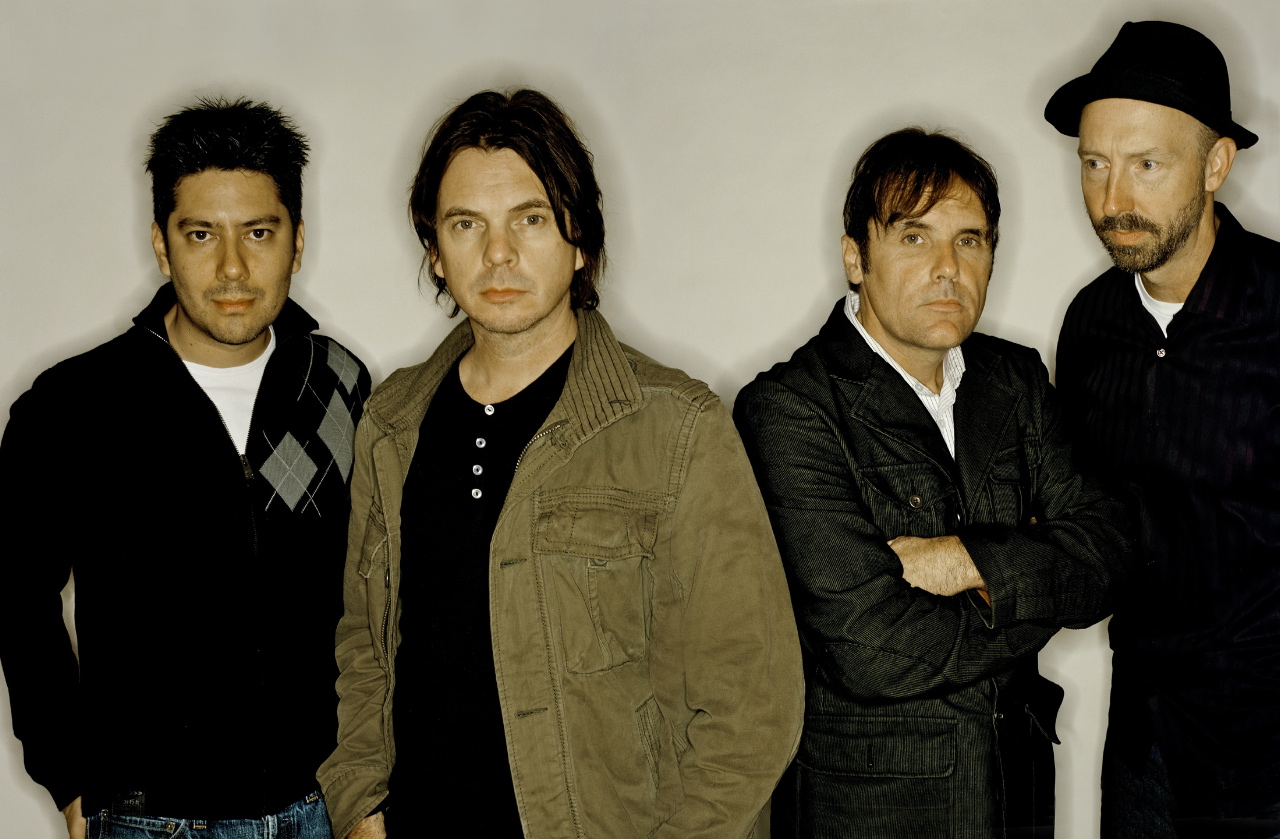Alternative rock band 54-40 rose from the Vancouver punk scene of the late 1970s to achieve mainstream success in Canada in the late 1980s and the 1990s. They have had four platinum albums and one gold album and have been nominated for eight Juno Awards. They are perhaps best known for the hit singles “I Go Blind,” “Baby Ran,” “One Day in Your Life,” “Nice to Luv You,” “She La,” “Ocean Pearl” and “Since When,” among others. The band has been inducted into the BC Entertainment Hall of Fame and the Canadian Music Industry Hall of Fame. “I Go Blind” was inducted into the Canadian Songwriters Hall of Fame in 2021.

Early Years
Brad Merritt (bass guitar) and Neil Osborne (rhythm guitar, lead vocals) met when they were students at South Delta High School in 1978. After graduating, Osborne briefly attended the Berklee College of Music in Boston before Merritt convinced him to return home to take part in Vancouver’s burgeoning punk rock scene. With Ian Franey (drums), Osborne and Merritt formed a band they called 54-40, a reference to a US political slogan from the 1840s (“Fifty-four forty or Fight!”) that called for the American annexation of what is now British Columbia. (See Oregon Treaty.)
The band’s debut performance took place on New Year’s Eve 1980 at the Smilin’ Buddha Cabaret on Hasting Street in front of about 100 people. As a trio (now with drummer Darryl Neudorf), 54-40 toured Western Canada in 1981 and contributed to the 1981 joint album, Things are Still Coming Ashore, issued by MoDaMu. In 1982, 54-40 issued its debut EP, Selection.
1980s
Phil Comparelli (lead guitar, keyboards, trumpet, back-up vocals) joined the band in 1982. In 1984, drummer Matt Johnson replaced Daryl Neudorf, who went on to enjoy a successful career as a producer with Vancouver’s Nettwerk Records. He is also credited as a co-writer on “I Go Blind.”
While many punk bands evolved into hardcore or new wave, 54-40 went on to blend roots-rock, folk, country, pop and alternative rock sounds. The band released its debut LP, Set the Fire, in 1984 and followed that with their self-titled sophomore album in 1986. It yielded the singles “I Go Blind” and “Baby Ran.” The band toured extensively along the West Coast of Canada and the United States and became a favourite on college radio stations. Show Me (1987) yielded the singles “One Day in Your Life” and “One Gun.” Fight for Love (1989) yielded three hit singles: “Miss You,” “Baby Have Some Faith” and “Over My Head.” The latter hit No. 1 on the RPM chart. That same year, the band received a Juno Award nomination for Most Promising Group of the Year.
In 1991, Warner Music Canada released the greatest hits package, Sweeter Things: A Compilation (1991), which went on to be certified platinum in Canada. It also marked the end of the band’s relationship with the label.
1990s
With their new record label, Columbia, 54-40 took a hard turn away from 1980s pop and embraced a more guitar-driven, blues-rock and grunge-rock sound. This proved to be the band’s most commercially successful period, as Dear Dear (1992), Smilin’ Buddha Cabaret (1994) and Trusted by Millions (1996) were all certified platinum in Canada. “Nice to Luv You,” “She-La,” “Music Man,” “Ocean Pearl,” “Love You All,” “Lies to Me” and “Crossing A Canyon” all hit the Top 40 on the Billboard Canadian Singles Chart. The band was nominated for Juno Awards for Group of the Year in 1993 and 1997. Smilin’ Buddha Cabaret — named after the venue where the band started out, which closed in 1993 — was nominated for Best Alternative Album in 1995.
On 13 December 1994, 54-40 became one of the first rock bands in the world to launch their own website on the Internet. Also in the early 1990s, Neil Osborne engaged in a public debate with fellow Vancouverite Bryan Adams over Canadian content regulations. Adams took the position that such rules — which mandate that Canadian media devote a certain percentage of their programming to Canadian-produced content — lead to mediocrity. Osborne took the opposing view; he argued that it helps Canadians compete with American and British acts, who have larger local audiences on which to build their reputations and sales. (In a 1998 interview, Osborne revealed that each member of 54-40 supported himself with a second job until the release of Smilin’ Buddha Cabaret in 1994, despite their popularity in Canada and frequent touring.)
Similar to such contemporaries as the Tragically Hip and Sloan, 54-40’s popularity in the United States was mostly at the college radio level. In Canada, however, they were a mainstay on pop and rock stations as well as on MuchMusic, where the band’s music videos were a staple in the late 1980s and throughout the 1990s. (See also the Maclean’s articles Canadian Rock Music Explodes; Canadian Music on a Roll.) The videos for “She La” and “Blame Your Parents” were nominated for Juno Awards for Best Video in 1993 and 1995, respectively.
In 1994, the American band Hootie and the Blowfish recorded and released a cover version of “I Go Blind,” which they had been playing live for nearly a decade. Their version was featured on the NBC sitcom Friends in 1995 and spent 39 weeks on the Billboard Hot 100, peaking at No. 13 and bringing 54-40 a new level of exposure.
In 1998, the band released Since When. Their highest-charting album to date, it reached No. 18 on Billboard’s Canadian Albums Chart. The lead single and title track was the band’s highest charting single (No. 11 on Billboard’s Canadian Singles Chart) and the album was certified gold in Canada. The song and the accompanying music video both won awards at the following year’s West Coast Music Awards, where the band also won the award for Best Rock/Pop Album from a Major Label Act. The band closed out the decade with the release of the two-disc live album Heavy Mellow (1999), featuring hard rock and acoustic versions of their biggest hits.
Later Career
The band released Casual Viewin’ in 2000 and Goodbye Flatland in 2003. On the band’s tour in support of the latter album, Dave Genn, formerly of the Matthew Good Band, filled in for Phil Comparelli, who needed time off for health reasons. Comparelli officially left the group in 2005 and was replaced full-time by Genn.
Also in 2005, 54-40 signed with True North Records, a major independent Canadian record label. The band released Yes to Everything in 2005, Northern Soul in 2008 and Lost in the City in 2011. Also in 2011, 54-40 was inducted into the Western Canada Music Awards Hall of Fame (now part of the BC Entertainment Hall of Fame). However, the band’s time with True North Records also came to an end; 54-40 released Lost in the City on their own label, Smiling Buddha Entertainment Complex.
In 2017, 54-40 became the first act to sign with El Mocambo Records, named after the fabled Toronto music venue and owned by merchant banker and Dragon’s Den personality Michael Wekerle. That year, the band was also inducted into the Canadian Music Industry Hall of Fame. The band released Keep on Walking in 2018. In 2020, they celebrated their 40th anniversary by releasing the single “Embassy Supreme” off the album of the same name. In 2021, “I Go Blind” was inducted into the Canadian Songwriters Hall of Fame.
See also Vancouver Feature: Buddha Smiles on Vancouver Punk Scene.

 Share on Facebook
Share on Facebook Share on X
Share on X Share by Email
Share by Email Share on Google Classroom
Share on Google Classroom





